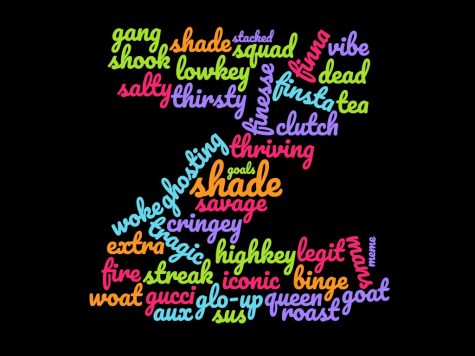‘Lit’ lingo: Gen Z transforms language
Fam, lit, bet and Gucci: These are four words among many that are familiar to members of Generation Z. Now, if you were to say those words to an adult from an older generation, they would stare at you with wide eyes and question your intelligence. These adults might wonder if you were speaking English or a strange, unintelligible dialect.
Each generation comes with a new set of words and phrases that are used on a daily basis. Though they begin as slang terms, these words and phrases inevitably become part of the everyday language.
For Generation Z, these words include “lit,” “salty” and “bet.” Throughout WHS, these words can be heard around the cafeteria and in the hallways as students are walking to class. With each word comes a different meaning and different way to use it. Freshman Emma Pietrewicz said, “We tend to shortcut things to avoid real language to talk to each other.” For example, the word “bet” essentially is another way of saying “OK, cool.” This shows that words change meaning over time and are approved by different generations to mean different things.
Although new slang terms are coined every year, several terms are used with the same ideas behind them. What was once “groovy” became “fresh,” which became “sick,” then became “swag” and is now “lit.”
English Teacher Ms. Bailey Verdone explained that she grew up in the era when chat rooms were becoming a big thing and during high school she would use acronyms such as “Lol” and “Brb” when texting. Nowadays, Verdone listens to her students say those acronyms out loud.
“I am fascinated by some of the new slang,” Verdone said. “I like asking my students what the translation would be.”
In addition to acronyms, Generation Z relies heavily upon emojis to communicate. On a daily basis, teenagers will use emojis to express their attitudes and feelings instead of typing them out.
“Perhaps the biggest change in language that has taken place over the last decade or two has occurred in the digital world as acronyms and emoticons have supplanted real words,” said English Teacher Mr. Darren Finkel. For example, instead of a person typing out “Lol,” they will send the laughing face emoji to show someone that what they said was funny.
Character count has also shaped the communication practices of this generation. On social media sites such as Twitter and Instagram, “Limited character space has forced people to simplify their speech,” said Finkel.
Urban Dictionary is a key resource for this generation. Anyone, epecially teenagers, can look up a slang term on Urban Dictionary through its website and on their mobile phones through an app.
For those who don’t know, Urban Dictionary is like a normal dictionary, but in this dictionary you are able to look up slang terms, whereas in a normal dictionary you would not be able to. Although neither Finkel nor Verdone will use these words in their own everyday sentences, they will use them when teasing their students. Both say they will use slang ironically to catch the attention of their students.
As each generation comes and goes, its members will bring their own terms to the table, expanding our language and the way we communicate with others. Generation Z has put a new spin on slang terms from older generations, showing that we’re not so different after all.
“I think language is pretty important to our generation,” said sophomore Lindsay Sherman. “Every year there’s a new word or phrase that becomes popular, which helps everyone communicate. This has been going on for decades, and our vocabulary continues to grow and expand.”
